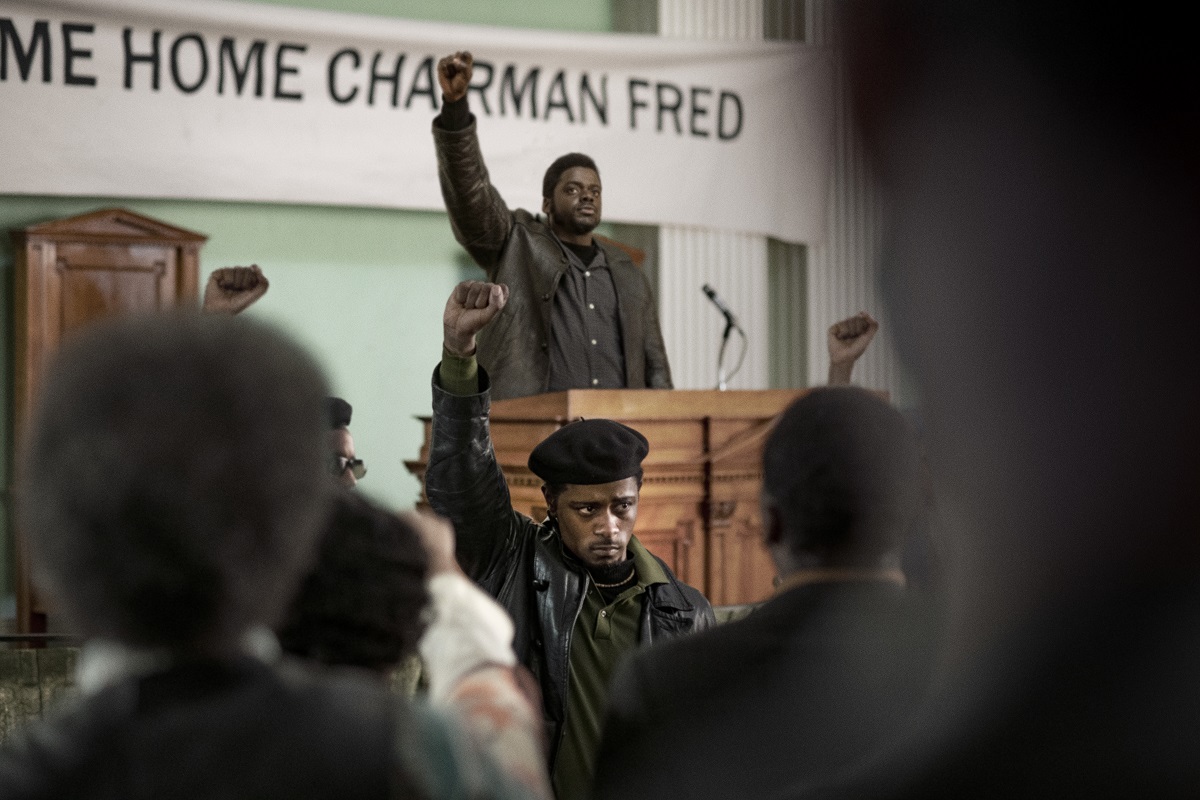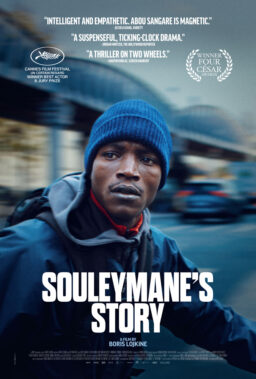How do you capture the embers of a revolution? The transfixing “Get Out” star Daniel Kaluuya and Chairman Fred Hampton Jr. undertake such a promethean effort in Shaka King’s crime-suspense biopic “Judas and the Black Messiah.” Recounting the brief life of Fred Hampton, the Chairman of the Chicago chapter of the Illinois Black Panther party, through the eyes of the man who would betray him, “Judas and the Black Messiah” explicates the FBI’s efforts to stunt the young speaker’s political ascent, leading to his assassination. But the reverberations of Hampton’s truthful voice, as an adroit community leader and an explosive, robust orator, have not diminished. “Judas and the Black Messiah,” at its best, is not just a relitigation of a murder. With King’s provocative camerawork, a sterling cast that includes Kaluuya’s electric performance, and the support of Chairman Fred Jr and his mother Akua Njeri (formerly Deborah Johnson), the biopic delivers his legacy to the present generation.
In an interview, Kaluuya and Chairman Fred Jr. spoke about the connective legacy of black political leaders and the film’s final brutal scene.
So much of “Judas and the Black Messiah” is about the lineage of Black leaders being connected, from Chairman Fred Hampton all the way to the present day. How do you consider the historical connective tissue of black leaders influencing one another?
DANIEL KALUUYA: I think he was the walking embodiment of that in terms of himself and his speeches. Every morning I’d listen to Martin Luther King and Malcolm X’s speeches in order to get ready for my day because I heard that Chairman Fred did that. He understood that he was speaking in a way that was going to have an impact longer than his time. Especially since he was speaking so much truth, and coming with an independent study. He was always going to have a huge ripple effect.
CHAIRMAN FRED JR.: This system knows our potential before we know our own potential. There was a wiretap placed on my grandparents’ home, right where I’m sitting right now, when he was 13, 14 years old. The FBI had seen this potential. Long-held political prisoner Mumia Abu-Jamal said to me, “They started at you at birth.” Not only in our community, but in others, we are rarely in a position to pass down generational wealth. Now we’re struggling to pass down generational information because generations are being snatched up and broken up. It’s important that we keep this conversation going and possibly take a couple copies of this movie, put it in a [time] capsule, and bury it underground and make it a new Timbuktu.
How long, Chairman, have you wanted a film made about your father?
CFJ: I would say how long have we waited, at minimum, to have the conversation. Whether it comes from a film or what have you, or on our own terms. ‘Cause there have been so many conversations that have been held by some of the same entities responsible for the subsequent assassination of Chairman Fred. And while there were some struggles about what could be put in the movie, the respect from Ryan Coogler, Charles King and so many others, and the main cast of actors—it’s been phenomenal.
How much of a critical resource was Chairman Fred Jr. and Mother Akua as you were preparing?
DK: That was a partnership. We locked arms. We had reverence. It wasn’t like, “Oh, you’re going to give us some stuff.” We wanted to come and explain that the most respectful and appropriate thing to do, in order to tell this story in a way we want to, is to have you guys be a part of this.
CFHJ: There was one day of pulls and struggles on the set. I recall sitting back, and a young lady said something to the effect that it’s like childbirth. I dare not attempt to relate to that experience. All due respect. But let’s use that analogy: We look forward to the baby being born. But mind you, we had to grab this baby too, in some aspects, from a foster home. There was so much misinformation put into this baby. So we have to continue nurturing this baby. And we look forward to a potential series and taking care of this baby for generations to come.
What do you think of the title of the film: “Judas and the Black Messiah”?
CFJ: There was a back and forth. There were also a number of different titles that were proposed. And not only the title, but our political positions clashed creatively for advantageous [results]. We found points of unity and went in with the sense that this title isn’t being done in the biblical sense, but J. Edgar Hoover himself articulated it in regards to the tangible, concrete, assassinations of black leadership. We want people to recognize that the Black Panther party was an actual organization. Chairman Fred was a real, tangible living, human being. They came in with real-deal bullets. The sky’s the limit. I’m looking forward to further conversations and further work.
“Queen and Slim,” when it was released, faced a backlash because some deemed it too traumatic or triggering. Did the response to that film affect the roles you wanted to take, specifically with this one, Daniel?
DK: That’s the filmmaker’s expression and that’s the filmmaker’s truth. I stand by Melina [Matsoukas]. I stand by Lena [Waithe]. That’s the expression of how they felt. Not everyone is going to love your shit. People are going to get triggered by it and you have to hold them within that. But I was promoting “Queen & Slim” while I was shooting “Judas.” So the decision to do “Judas” wasn’t in response to “Queen & Slim.”

What was it like working with Daniel with regards to representing your father?
CFJ: I don’t even want to speak in the past tense. Our ongoing relationship is that of respect for Chairman Fred. He called me this past December 4, International Revolutionary Day, unprompted. But just watching him on-set going through the wardrobe process, getting ready with the sideburns. Before I always used to say, “How does Denzel Washington get into those different characters?” Daniel is a helluva of an artist. A helluva brother and person.
And could you expound on the importance of bringing Fred Hampton’s life to a new generation, Daniel?
DK: It’s incredibly important for him to assume his rightful position. Because this was an assassination of not only his body, but also an assassination of what he did and what he stood for and what he represented. From Hoover antagonizing the Black Panther party and Chairman Fred, and stopping him from growing to the national level he was about to get to. Interrupting that manipulation is one of the purposes and the intentions of this narrative.
Not just that, but his home was demolished long ago under some suspicion, too.
CFJ: The actual destruction of the home, the apartment at 2237 West Monroe, which we refer to as “Chairman Fred Hampton Way,” was done within three weeks of the destruction of the Illinois Chapter Headquarters for the Black Panther party on the corner of 2350 West Madison. All of these were strategic hits. Much how Napoleon shot at the nose of the Sphinx in Egypt. These buildings were taken down as part of the ongoing process to take away from the history of Chairman Fred. His tombstone is shot up annually by law enforcement. We have to do everything we can to fight, for instance, to preserve his childhood home. We have to continue his legacy.
What was the process like building chemistry with Dominique Fishback, Daniel?
DK: We just listened to Dominique a lot. [laughs] She has incredible ideas. I mean, she wrote that poem. And we just spoke a lot, personally, because she couldn’t make the rehearsals. So every time I had a rehearsal, I’d call her up and say, “Yo, this is what we did.” So we just kept her in the loop. ‘Cause this arc, within the narrative, is so important because this is a window into the humanity of these people. And so we just stayed connected and stayed to learn.

When did you first hear it? On-set or before?
DK: She waited for me to be on set, so it would work. Because I’m supposed to be hearing it for the first time. But Shaka took it in and was like, Yeah. Just say that poem.
The biggest scene is the FBI raid ending the film. Both Chairman Fred Jr. and Mother Akua (formerly Deborah Johnson) were on the on set. What was the mood?
DK: Not good. I felt very down. It was a very unsettling thing to be a part of. And my spirit was not in great spaces when we were doing that scene. But you know, in order to tell the truth, you’ve got to tell the whole truth.
CFJ: Watching with a critical eye, I recall our struggles to make sure that the brutal realities were reflected. Some of them were issues people may not like to talk about. James Glover Davis, a Negro police officer, had his role [in the assassination]. I recall after shooting that scene, going back to the hotel, and saying to the individual who played James Glover Davis, “You gotta step back. You’re a little Too close. [laughs] I can’t get on the elevator with you.”
But it was intense. I remember Dominique Fishback, after the scene, she commented that my eyes were a little watery. I said—”That’s from allergies.” [laughs] We joke about it to this day. But the scene is something that needs to be shown as much as we possibly can so we might reflect about what lengths this government has, will, and did go to to cease our struggle for self-determination.
“Judas and the Black Messiah” will be available in theaters and on HBO Max on February 12. To read Odie Henderson’s review of the film, click here.












